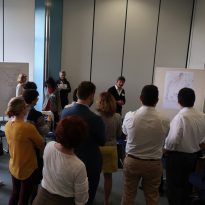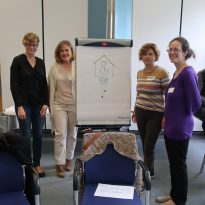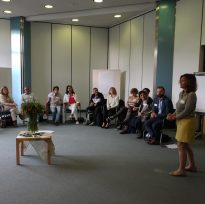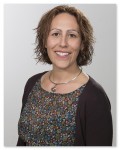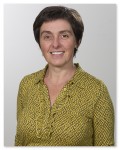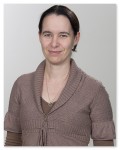Dr Farzana Khan (Dhaka, Bangladesh) talks about health partnership and advocacy, which are two priori points to develop a sustainable palliative care service in humanitarian camps
EAPC eupca Leadership Award 2021
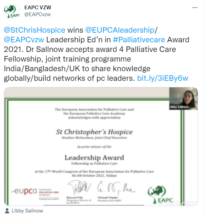
EAPC Congress 2019: Leadership Expert Dr Sally Watson with Keynote at our Pre-Conference Session
The leadership expert Dr Sally Watson will be one of the two keynote speakers at the EUPCA pre-conference session (22nd May 2019, 3.00 – 6.00 p.m., at 16th EAPC World Congress in Berlin).
Dr Watson, who works at Lancaster University, will talk about new approaches for leadership in palliative care.
Here she talks about her leadership experience:
“Leadership has been a powerful theme throughout my career. Eight years service, as a British army officer, exposed me to military styles of leadership, which were value driven, team based, and highly structured around a clear ‘chain of command’.
My transition to civilian life was a planned event in 1985 through a one year Masters in Management Development. I consciously experimented with both theory and practice to understand the shifts in leadership theory. New models of leadership were emerging that embraced cultural perspectives and so my fascination for discourse analysis began.
These new models challenged the myth of order within an organisation. The organisational metaphor of machine remains popular but it is not sophisticated enough to help leaders today. The role of emotions in the process of human personal change had a big impact on leadership theory at the time.
Organisational Development became a new field and this shaped my career as a management consultant. On completion of the Masters, I worked for 15 years, on diverse projects with leaders in a full spectrum of private and public sector organisations. My learners could be as diverse as bankers, hotel managers, manufacturing engineers, local government officials, managers, teachers, clinicians, telecommunications experts and social workers.
Leadership development ranged from residential weeks, modules, workshops and work based projects. The programme designs were highly customised to diverse needs. This work of developing leaders was inspiring and I was privileged to watch many talented women and men reach senior positions. They did not need an expert to tell them what to do. They needed support and a quality-learning environment to build their confidence.
During this period I realised that reality of leading others did not always match the explosion in literature on leadership. It occurred to me that theory was trailing behind societal and community changes. By the early 1990’s, new models of leadership appeared with greater emphasis on transformation and the interaction between leader and followers. Followership was no longer seen as a passive relationship with a single nominated leader but a critical political dynamic for a leader to understand.
In 1997, my path steered very quickly towards an academic career. I started with a Masters in Peace Studies and researched leadership discourses during the formulation of the Good Friday agreement. This study morphed into a PhD in Conflict Resolution. During both degrees, I worked full time in the Management School at Lancaster University in UK. I was promoted twice, Head of Management Development and Director of Executive Education.
For 20 years, my career developed in an academic environment. I designed leadership programmes for British, European and International clients. This work brought me into contact with Hospice UK and the International Observatory on End of Life. We created a Masters in Hospice Leadership with an alumnae network of 80 senior leaders across UK.
Organisations are now conceptualized as systems with interdependent teams and units. This organisational model requires new forms of leadership that are more collaborative and involve power sharing. This presents additional burdens on leaders who are likely to be facing external political, economic and social challenges. So now my approach is pragmatic. Leaders need to be aware of different approaches to leadership, knowledgeable and well informed but above all, have confidence in themselves and their unique style. The search for understanding about leadership starts from within.”
Read more about the pre-conference session & join the event: Pre-Conference Session (Event at Facebook)
European Palliative Care Academy 2017-19: 3rd Course Week in Gdańsk, Poland
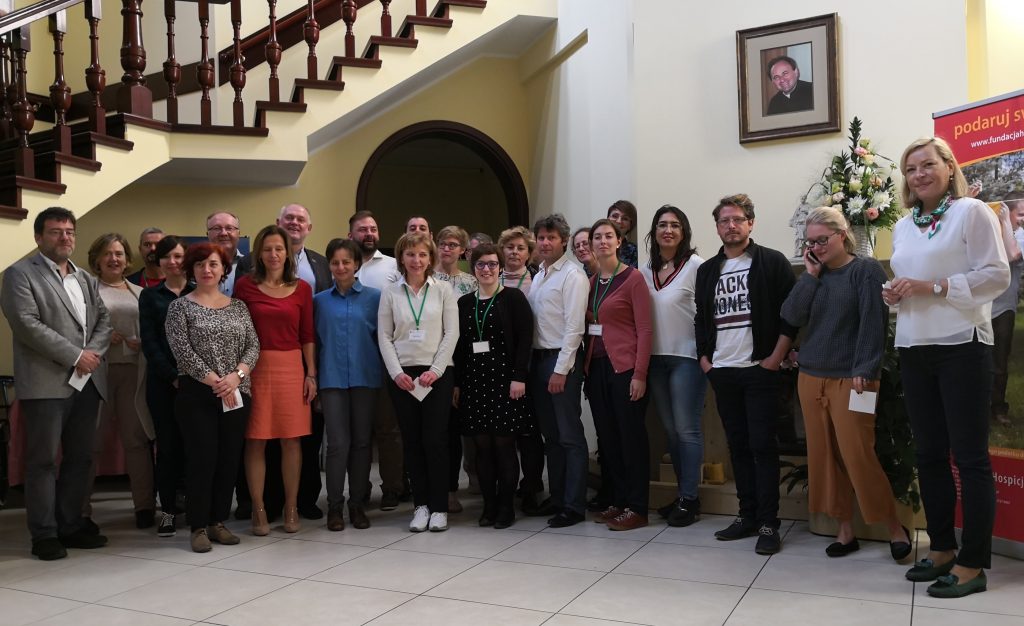 At the end of September 2018, our leaders and leaders in the making travelled to Gdańsk for the third course week of the European Palliative Care Academy. The course week was conducted by the Nicolaus Copernicus University of Torun and Hospice Foundation and took place at the Fr. Dutkiewicz Hospice in Gdańsk.
At the end of September 2018, our leaders and leaders in the making travelled to Gdańsk for the third course week of the European Palliative Care Academy. The course week was conducted by the Nicolaus Copernicus University of Torun and Hospice Foundation and took place at the Fr. Dutkiewicz Hospice in Gdańsk.
Prof. Rev. Piotr Krakowiak and Dr Anna Janowicz explain:
The focus of the Gdańsk week was on teamwork in palliative care and included aspects of how to build a team as a leader, and how to communicate effectively in that team. Support in the team to prevent burnout and challenges for interdisciplinary teams as well as challenges which arise with spirituality and interculturality were elaborated on during workshops and discussions. The participants also had their next sessions on Project Management, an ongoing module for continuous development where participants are supported and coached on their personal projects.
Sessions were held by many experts in palliative care including Prof. Piotr Krakowiak and Dr Anna Janowicz from Poland (who were also responsible for the course week) and Prof. Raymond Voltz and Dr Christine Kuch from Germany. Prof. Piotr Krakowiak and Dr Anna Janowicz reported that participation of the group was very good and most of the lecturers were received very positively, with many vivid discussions and sharing. What was remarkable this time, that also after the classes discussions among students continued during breaks, after classes and even before them in the mornings.
The EUPCA participants also had the chance to visit the Dutkiewicz Hospice as part of the Local Best Practice module, and hear about various promotional, fundraising and charitable activities of Hospice Foundation, being one of the leaders of palliative care in Poland. The Hospice celebrates 35th Anniversary, being the first home care hospice in Poland, so it was very special time for team from Gdansk. They shared their experiences in caring for adults and children at home and in inward hospice house, showing their cooperation with various groups of volunteers, helping in care, in funding and educating the community.
After the long working days, the participants were tired but full of positive energy, inspirations, knowledge and skills. They have started the week with the visit of Old Town & City Center of Gdansk and toward the conclusion there was a time to celebrate unity in diversity in occasion of the birthday of one of the student with songs of Happy Birthday in 15 different languages during our Gala Dinner.
Students motivated by the teamwork exercises were having great ideas regarding possible future cooperation in the Alumni Association of EUPCA, which they shared with Prof. Raymond Voltz and Prof. Piotr Krakowiak. They were received with attention and asked to present their proposal for Alumni to the Steering Committee of EUPCA.
We look back on a successful week and would like to thank all participants, lecturers and others involved! We hope to meet all of you together in Brasov and to hear your stories at the end of the course.
European Palliative Care Academy 2017-19: 1st Course Week
The Centre for Palliative Medicine of the University Hospital of Cologne welcomed the third cohort of EUPCA (European Palliative Care Academy) participants from September 25th till 29th. The 20 future palliative care leaders from 13 countries around Europe were selected during the application process in the early summer.
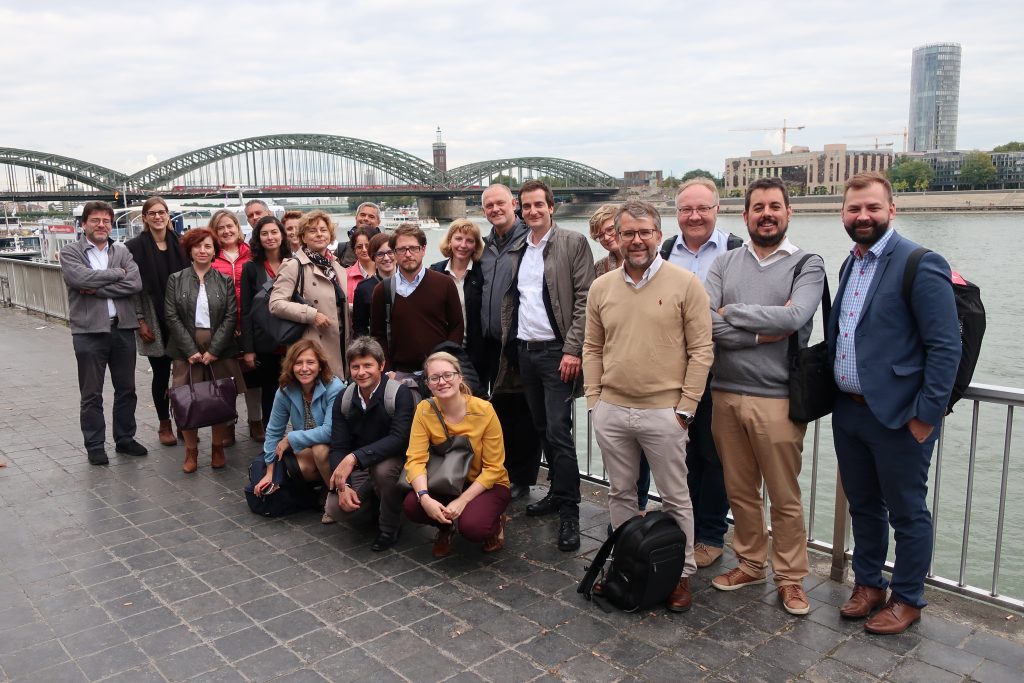 Aim of this unique further education course is to prepare specialists in palliative care for prospective leadership tasks in their professional lives. The European Palliative Care Academy focuses on Personal Development, Project Management, Teamwork, Research Methods and Advocacy and supports participants to successfully implement their personal project in their region or institution.
Aim of this unique further education course is to prepare specialists in palliative care for prospective leadership tasks in their professional lives. The European Palliative Care Academy focuses on Personal Development, Project Management, Teamwork, Research Methods and Advocacy and supports participants to successfully implement their personal project in their region or institution.
During the first course week in Cologne all modules where introduced and the participants archived skills primary in Personal Development, tutored by Prof. Dr Daniela Mosoiu and Malina Dumitrescu from Romania and Project Management, tutored by Prof. Dr Raymond Voltz and Dr Christiane Kuch from Germany.
The group turned out to be a great mix from different countries, professions and backgrounds which made lively group sessions and interesting discussions possible.
We look back on a successful week and would like to thank all participants, lecturers and others involved!
bildeinbindung
Lorem ipsum dolor sit amet, consetetur sadipscing elitr, sed diam nonumy eirmod tempor invidunt ut labore et dolore magna aliquyam erat, sed diam voluptua. At vero eos et accusam et justo duo dolores et ea rebum. Stet clita kasd gubergren, no sea takimata sanctus est Lorem ipsum dolor sit amet. Lorem ipsum dolor sit amet,
![]()
consetetur sadipscing elitr, sed diam nonumy eirmod tempor invidunt ut labore et dolore magna aliquyam erat, sed diam voluptua. At vero eos et accusam et justo duo dolores et ea rebum. Stet clita kasd gubergren, no sea takimata sanctus est Lorem ipsum dolor sit amet. Lorem ipsum dolor sit amet, consetetur sadipscing elitr, sed diam nonumy eirmod tempor invidunt ut labore et dolore magna aliquyam erat, sed diam voluptua. At vero eos et accusam et justo duo dolores et ea rebum. Stet clita kasd gubergren, no sea takimata sanctus est Lorem ipsum dolor sit amet.
- Nancy
- Mary
Aims
The overall aim of the European Palliative Care Academy is to enhance Palliative Care in Europe by contributing to closing the gap in further education.
The aim of the course is to support future leaders to develop the necessary skills, abilities and expertise to advance palliative care across Europe and to address future challenges in the field.
Summary
The European Palliative Care Academy is an initiative of the Robert Bosch Stiftung, a major German charitable foundation associated with a private company.
It is a joint project of the Robert Bosch Stiftung and the four academic centres
- University Hospital Cologne/ Germany
- Nicolaus Copernicus University, Bydgoszcz/ Poland
- Hospice Casa Sperantei, Brasov/ Romania
- King’s College London/ United Kingdom
These institutions jointly developed a curriculum and will offer it to emerging palliative care leaders of all professional backgrounds. The academic institutions offer one face-to-face teaching week each, so that the participants will visit all four institutions throughout the course. The medium of instruction is English. In addition to the four teaching weeks, the participant will do one week of observation in a European palliative care institution of its choice.
Together with continuous assignments and a personal project the course comprises 600 hours and should be completed within 1.5 years. The course is to be completed part-time, enabling the participants to continue their work in palliative care. The first course will start in September 2013. The course will be repeated every two years.
Palliative care has been a concern of the Robert Bosch Stiftung for more than two decades. After supporting the German Hospice Movement in the 1980ies and 1990ies, it has mainly been supporting the advancement of palliative care for children and the elderly as well as the introduction of palliative care in South Eastern Europe, especially in the Republic of Moldova. With its new funding initiative – the European Palliative Care Academy – the Robert Bosch Stiftung is bringing its activities to a European level.
